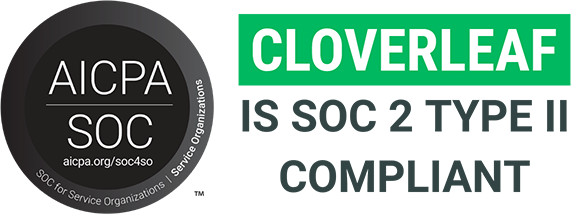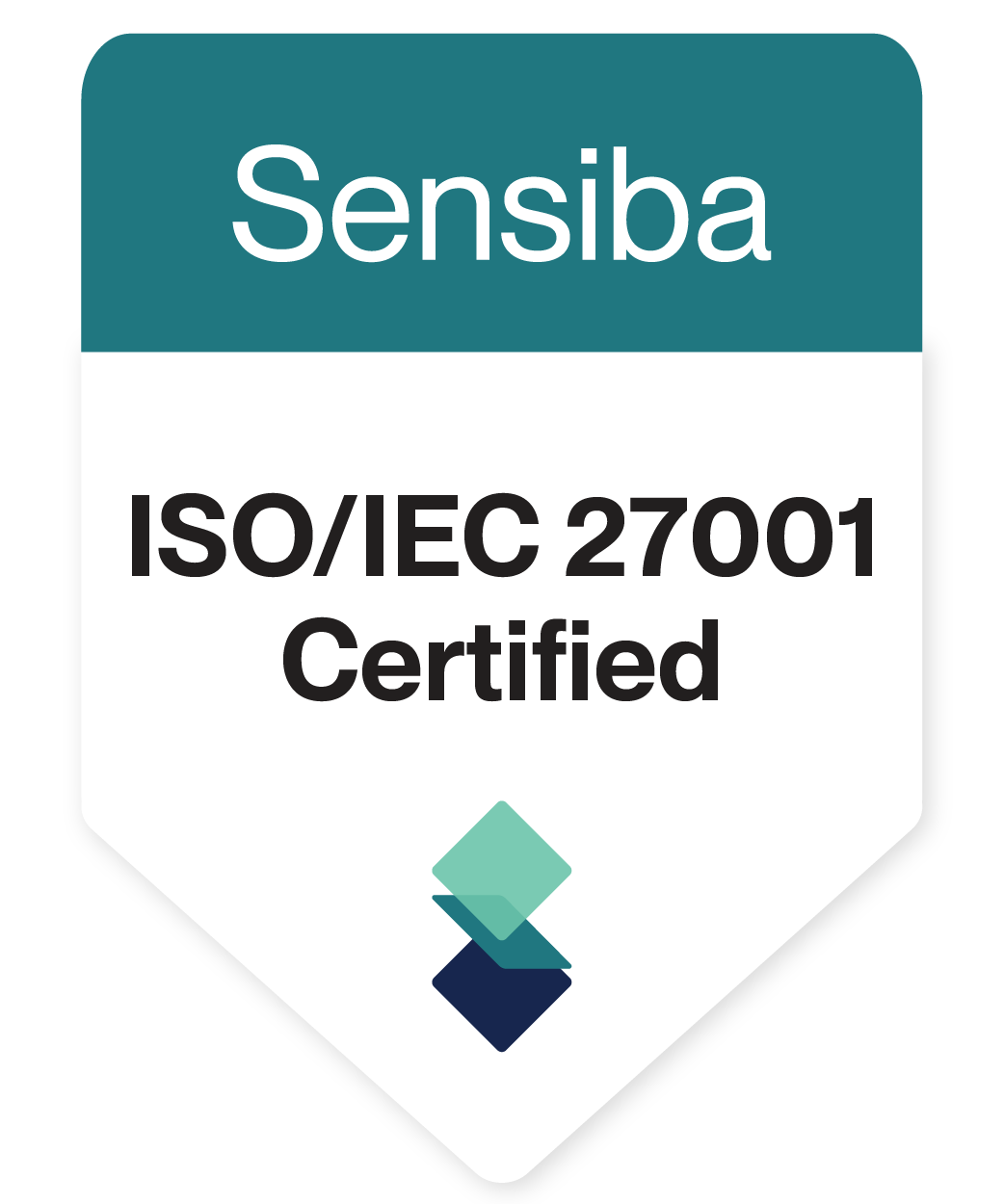In today’s rapidly evolving workplace, businesses constantly strive to improve employee performance and foster a motivating coaching culture. One emerging trend in achieving this goal is the use of Automated Coaching.
But why is Automated Coaching™ so valuable? As businesses aim to provide targeted and impactful coaching, they face challenges in developing effective training programs tailored to employees’ needs.
By leveraging data-driven insights and personalized coaching, organizations and teams can effectively identify skills gaps, develop tailored training programs, and drive learning and development initiatives aligning with organizational goals.
Let’s look at what Automated Coaching™ is and discover why it’s quickly becoming an essential component of leadership development in the modern workplace.
Key Takeaways:
👉 Despite numerous L&D initiatives, employee behavior is only modestly impacted.
👉 Optimized learning occurs when the experience is customized, integrated into the workflow, and available on demand.
👉 Automated Coaching™ offers relevant, real-time prompts for improved emotional intelligence, communication, collaboration, and conflict resolution.
👉 Employees require smaller, well-timed insights that can be processed and applied daily for growth.
👉 Automated Coaching™ can scale to provide development opportunities for all employees.
Take A Tour Of Automated Coaching In Action
Automated Coaching Is An Evolution in Self-Directed Growth and Development
Traditional coaching entails the dyadic relationship between coach and coachees, which involves a process of collaborative goal-setting, constructing solutions, and fostering the coachee’s self-directed growth.
With Automated Coaching™, the goal is pre-defined (i.e., enhancing self-awareness and other-awareness), and the automated coaching system generates solutions that foster the coachee’s self-directed growth.
In turn, Automated Coaching™ provides relevant, in-the-moment prompting and insight that individuals can directly apply to increase emotional intelligence, strengthen communication, identify opportunities for collaboration, and work through conflict successfully with teammates.
Cloverleaf uses assessment data to provide digital nudges to everyone within a team or organization to improve performance, increase managerial effectiveness, strengthen cross-functional collaboration, and inspire personal development.
A consolidated dashboard provides insights into employee strengths, weaknesses, and areas for improvement. From validated personality and strengths assessments to daily coaching, this approach can help organizations improve collaboration, strengthen performance, and better understand the needs of their teams.
Get the full guide to Talent Development in the Age of AI. Empower your people to address conflict, strengthen collaboration, and create a culture of trust.
How Automated Coaching™ Revolutionizes Daily Growth and Development in the Workplace
One of the advantages of Automated Coaching™ is that it can be “pulled” at the coachees’ convenience and that it can be “pushed” every day, as many times as the system is programmed.
Unlike other L&D opportunities, Automated Coaching™ can facilitate coachee growth on a day-to-day basis. This approach aligns with several theories in organizational behavior.
Organizational Behavior Theories That Support Automated Coaching Strategies
1️⃣ According to social learning theory, human beings can only attend to, process, and retain a limited amount of information. Said differently, people can’t internalize information like super-computers. If organizations want their employees to grow, they must deliver smaller, digestible, well-timed insights that they can process and apply daily.
2️⃣ Research concerning clinical psychology on using “micro-interventions”–small and short interventions void of human contact–can help patients with anything from anxiety to addiction.
These microlearning interventions align with what’s called metacognitive prompt theory, which suggests that you can nudge people to be more aware of their situation through purposeful reflection, which leads to more heightened self-regulation and behavior change.
📊 Cloverleaf has researched this phenomenon, and the results are promising. The extent to which users engaged with the automated coaching program positively impacted several important outcomes, including:
👉 An enhanced desire to learn more about themselves and their work,
👉 Improved interactions with team members,
👉 And an overall better mood while at work.
The Problem with Traditional Learning and Development Initiatives
Leadership and development (L&D)—the process of helping employees increase performance and well-being in organizational settings—is a $366B industry.
L&D is everywhere, with larger organizations having in-house L&D departments/positions, Universities offering L&D-specific degrees (e.g., master’s degrees, executive education), dozens of the world’s largest consulting firms specializing in L&D offerings, and hundreds of thousands of small businesses and solopreneurs engaging in L&D through individual and team-based coaching and consulting.
Despite the sheer magnitude of L&D interest and initiatives, meta-analytic evidence suggests that its impact on employee behavior is relatively modest.
The source of the issue is that learning and development typically manifest as a one-time initiative where participants are inundated with recommendations.
This approach is misaligned with the fact that human beings can only process and retain a limited amount of information in one setting. Further, L&D is typically delivered as a pre-packaged and static offering, which overlooks that individuals are different and that their priorities, careers, and lives are constantly in flux.
Research suggests that learning and behavior regulation are optimized when the experience is customized to users’ characteristics and needs, integrated within one’s workflow, and available on demand.
💡Human beings can’t accommodate these features at scale, but technology certainly can. Automated Coaching™ can make a substantial impact for talent leaders who want to change the culture and reach more people.
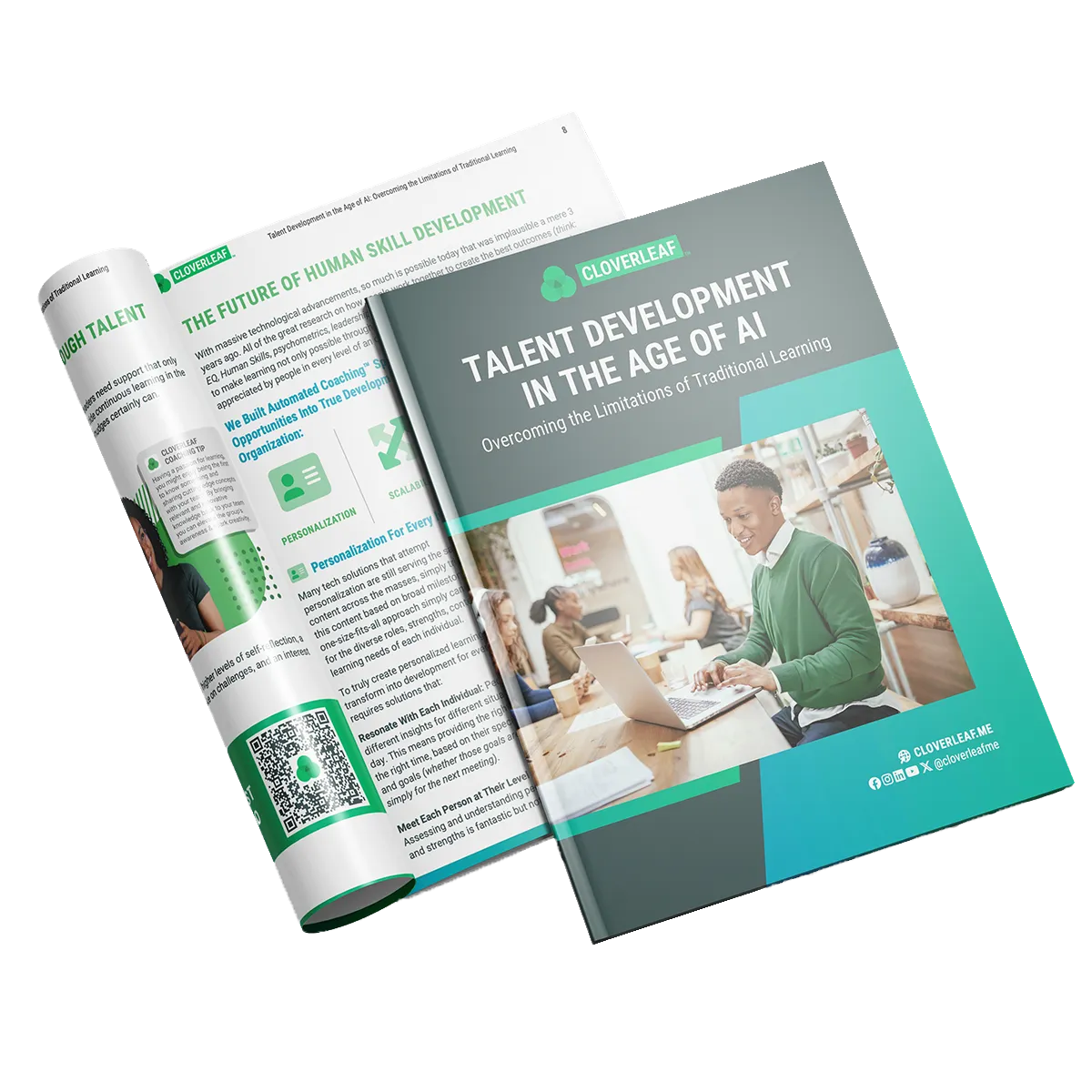
Is Your People Development Strategy Keeping Up?
See How Leading Teams Use Tech To Stay Ahead.
Will Automated Coaching™ Replace Or Support Traditional Coaching Practices?
Automated Coaching™ will supplement, not replace, traditional coaching. Prior research illustrates that, when done well, coaching increases coachee performance and well-being.
Automated Coaching™ gives coaches a more efficient method for staying connected with their coachees. It also gives them richer material to discuss with their coachees. In an ideal world, employees have access to both.
Unfortunately, many don’t experience the benefits of coaching, given the cost, lack of access, or time commitment. Technology can help close this gap by lowering costs and making coaching more scalable and widely available to diverse groups.
Is Automated Coaching™ The Same Thing As Artificial Intelligence?
Automated Coaching™ is broader than artificial intelligence (AI). However, where appropriate, AI can play a fundamental role in helping make Automated Coaching™ more adaptive and impactful.
We are far from “strong AI,” whereby machines are fully autonomous with general intelligence. Indeed, AI is making substantial process over the last decade, making it easier for organizations to incorporate into products like Automated Coaching™.
However, applying “weak AI,” whereby specific algorithms are embedded to solve particular problems, is more representative of what coaching and Automated Coaching™ have the potential to incorporate in the short term.
How Can Development Leaders Adapt To What’s Possible With Coaching for Today’s Workplace
Traditional coaching strategies have shortcomings that can be felt across an organization. However, scaling the development of team members is more tangible today.
As outlined here, there are four significant challenges to traditional coaching models that hinder their effectiveness in the workplace:
- It is often limited to the coachee’s perspective
- Providing a human coach is costly
- Relevance and timeliness are limited due to scheduling
- Proving impact that affects organizational results
As such, innovation is needed to address these challenges related to organizational training and development. Automated Coaching™ overcomes the challenges leaders are familiar with in delivering coaching to their employees.
Automated Coaching Technology Is:
✅ Scalable
✅ Timely
✅ Measurable
Unlike traditional coaching models, Automated Coaching™ can scale to increase access to development opportunities for everyone in an organization. This means that employee coaching is no longer limited to a select few but can widely extend throughout a company.
What’s more, Automated Coaching™ provides employees with a greater number of coaching moments than traditional practices.
Instead of relying on monthly sessions where individuals hopefully gather a handful of understanding, Automated Coaching™ integrates into the user’s workday to offer in-the-moment, relevant insights and tips.
Additionally, Automated Coaching™ offers a unique advantage in the form of user feedback, allowing individuals to provide input on the coaching tips they receive.
This immediate feedback response enables users to obtain better insights and more applicable coaching tailored to their specific growth. Therefore, Automated Coaching™ can adapt to the needs of each individual, making it a powerful tool for employee development and organizational performance.
A Powerful Tool For Collective People Development
As businesses seek new ways to streamline training and deliver impactful coaching, Automated Coaching™ provides a unique solution. With the ability to adapt to the specific needs of individuals, it is a powerful tool for employee development and organizational performance.
The future of leadership development lies in this customized, on-demand coaching that can enhance skills and increase performance, transforming the workplace for years to come.
Finding satisfaction in your career has become harder with the changing work landscape and a constant buzz of social media notifications. Companies are moving towards initiatives that include new and foreign hour structures, virtual meeting styles, digital workspaces, and more. For many, developing these new skills can be overwhelming.
Job coaching has come a long way from the days of fluorescent-lit rooms with slide screen presentations. Now, with new technologies and modern connectivity at our fingertips, learners have an opportunity to step out of those well-lit rooms and into a sunnier digital space of personalized, quality-driven, job coaching.
What is Job Coaching?
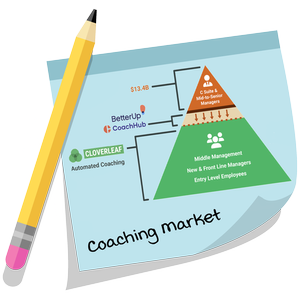
Job coaching comes in many forms and plays an important role in creating interconnected teams, improving employee communication and interpersonal skills, increasing work awareness, and understanding others’ needs alongside one’s own. From executive officers to new hires, there is a spot for everyone but not everyone has taken advantage of these new opportunities. Let’s go over some differences in coaching styles and see some ups and downs.
What is Executive Coaching?
Executive coaching or executive development is an agglomerate phrase and a well-known term covering several mentoring subcultures. From one-on-one mentoring to executive seminars, these coaching styles focus on educating the top of a traditional org chart to better position the business for success or help the CEO make better decisions. In a sense, it’s traditional coaching but there can be a variety of variations that tailor to the needs of the individual.
Despite the high profile, Executive coaching has ups and downs. It is a nebulous term that often encompasses wide-spanning terminology such as goal setting, personal development, and individual success. These terms are notoriously vague and many can see no improvement due to murky goal setting. Despite the terminology, Executive Coaching often leads to a highly focused coaching style that caters to the individual benefits of business leaders but at an often high price per session.
What is Coaching On Demand?
Coaching on demand is a version of executive coaching that is targeted to early and mid-career professionals. This type of coaching is typically booked online through an app or website. Most sessions are virtual, facilitated by a certified coach, and are offered at a steep discount compared to other types of executive coaching.
On-Demand coaching like this makes executive level coaching accessible to more people. A professional schedules an appointment at a time convenient for their schedule or for a specific challenge, and the two parties usually don’t develop a long-term coaching relationship. This type of executive coaching works well to help solve a specific career problem or crisis, but doesn’t allow for longer-term leadership development and progress.
What is Mid-Level Coaching?
This coaching style has been popular for a long time and has been the butt of plotlines and jokes across popular media for decades. With phrases like “Leadership Seminars” and “Success workshops” this coaching style widens its target demographics and focuses on the middle to upper-level management. From directors to the executive suite, mid-level coaching often takes place in groups and often follows the same ideas as executive coaching, but brings in a coach from outside the organization to offer help.
The goal of most mid-level coaching opportunities is to break down the boundaries that upper-level management places on themselves through work culture, stress, career style, and more. It is a calculated and coordinated second opinion that looks to improve decision-making, flexibility, and leadership skills.
These phrases and uses for Mid-Level coaches seem as vague as Executive Coaching, but it is far from it. The nebulousness of on-demand coaching comes from its large array of tools and uses. However, the cost typically associated with this type of leadership coaching is significant which makes it incredibly difficult to scale and does not offer the same impact that many get from executive coaching.
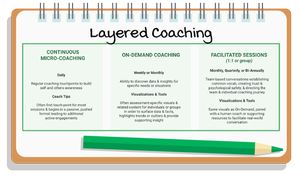
What is Micro-Coaching by Cloverleaf?
Cloverleaf’s coaching style finds its success in the digital nature of most modern businesses where new technologies combined with teamwork are the driver’s of a business’ success. Micro-coaching or continuous micro-coaching or Automated Coaching™ is the use of weekly, daily, hourly, or continual coaching in micro-doses. Think of it as small snippets of helpful information to optimize the day for success and increase the daily takeaway.
Micro-coaching, like a digital business, thrives on algorithms and data. Cloverleaf personalizes its professional development through personality tests like the Enneagram, DISC, Energy Rhythm surveys, Strengths Finder, and other metrics. These suggestions provide answers and integrate team-related content into its coaching sessions.
This small tweak to the traditional model of coaching offers new approaches for team collaboration and employee development. By providing team analysis, Cloverleaf can take the Enneagram and DISC of each member and plot them on charts to better visualize how each member learns, works, rests, and creates, allowing for a more agile and high-performing team.

HUMAN SKILL PROGRAMS ARE HITTING LIMITATIONS...
5 THINGS THIS FREE RESOURCE WILL TEACH YOU
- Close the widening gap between learning and on-the-job application
- Overcome the tension of pausing productivity for development opportunities
- Integrate learning so it is actually in the flow of work
- The evolution of human skill development
- What Automated Coaching™ is and how it works.

